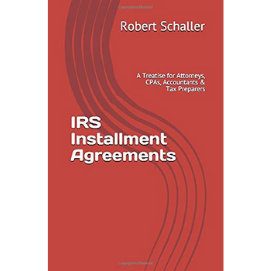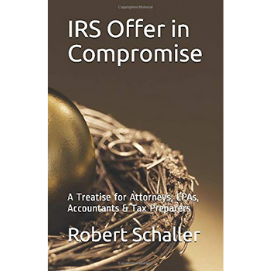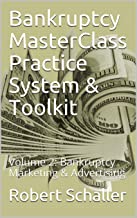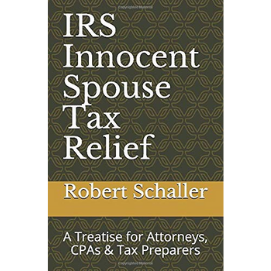Description
IRS Offer in Compromise, Installment Agreements & Innocent Spouse Relief: A Treatise for Tax Professionals *2021 Edition* offers tax professionals a 664-page scholarly treatise on the IRS programs that relieve taxpayers from crushing IRS back-taxes. This is a must-have resource book for any tax professional offering back-tax relief services. Citing specific authorities, this book offers a deep dive into the U.S. Tax Code, Treasury regulations, court opinions, the Internal Revenue Manual, and IRS Revenue Procedures that comprise the IRS’ back-tax relief programs. The 22-page Table of Contents, 48-page Table of Authorities, and 28-page Index aids tax professionals’ scholarly understanding.
Offer in Compromise relief should be explored by taxpayers who are unable to pay the full tax liability prior to the collection statute expiration date. An Offer in Compromise is an agreement between a taxpayer and the IRS that resolves a taxpayer’s tax liability by payment of an agreed upon reduced amount. This book focuses on doubt as to collectibility offers only. Included is a line-by-line analysis of IRS Form 656, Offer in Compromise and Forms 433-A & B (OIC), Collection Information Statements. Key Offer in Compromise issues are explored, including: the IRS’ authority, motivation, and basis to eliminate back-taxes; an overview of the Offer in Compromise process; who should submit the Offer in Compromise application; payment issues; and whether the Offer in Compromise application is “processable” and qualifies for further review.The mathematical formula is revealed to calculate the lowest offer amount acceptable to the IRS, including a discussion of the “reasonable collection potential” or RCP. Separate chapters analyze the asset, income and expense components of the formula. Other chapters discuss “terminated,” “withdrawn,” “returned,” “accepted” and “rejected” offers, and a taxpayer’s obligations during the IRS investigation and post-acceptance. Further chapters analyze a taxpayer’s right to receive tax refunds and right to appeal an adverse decision.
Installment agreements should be considered when a taxpayer has the wherewithal to pay the tax liability prior to the CSED and wants to avoid IRS collections and repay back-taxes over time. A separate discussion is presented for requesting an agreement, including a line-by-line analysis of IRS Form 9465, Installment Agreement Request. This book defines a “pending” installment agreement request and reviews the taxpayer’s power to withdraw a pending request. Key metrics are discussed regarding the IRS acceptance and rejection determinations. A taxpayer’s appellate rights to review rejected installment agreement requests is analyzed. Next, the book analyzes the criteria for modifying approved installment agreements by taxpayers and the IRS. Installment payment amounts and methods are considered, including a taxpayer’s ability to liquidate or borrow against assets and the One-Year Rule to modify or eliminate expenses.
Innocent Spouse Relief relieves a requesting spouse (or former spouse) from joint and several tax liability on equitable grounds or when the tax is attributable to a non-requesting spouse’s bad behavior – including fraud, income concealment, income misstatement, and unwarranted expense deductions or tax credits. A separate discussion is presented for Innocent Spouse Relief, Separation of Liability Relief, and Equitable Relief, including a line-by-line analysis of IRS Form 8857, Request for Innocent Spouse Relief. The book also explains premature and untimely relief claims, appellate review of rejected claims, and refund claims after relief is granted.
IRS Offer in Compromise, Installment Agreements & Innocent Spouse Relief: A Treatise for Tax Professionals also examines powers of attorney and third-party authorizations, including a line-by-line analysis of IRS Form 2848, Power of Attorney and IRS Form 8821, Tax Information Authorization.








Tax Law (verified owner) –
Take your practice to the top shelf and start practicing like an expert! This is a must-have resource book for any tax professional offering back-tax relief services. Citing specific authorities, this book offers a deep dive into the U.S. Tax Code, Treasury regulations, court opinions, the Internal Revenue Manual, and IRS Revenue Procedures that comprise the IRS’ back-tax relief programs. To negotiate effectively with the IRS, tax professionals must understand the law and be able to cite statutes, regulations or the IRM to support their position. The 22-page Table of Contents, 48-page Table of Authorities, and 28-page Index aids tax professionals’ immeasurably.